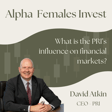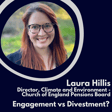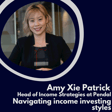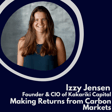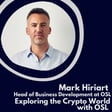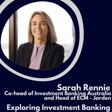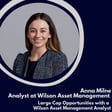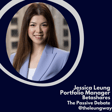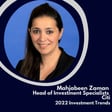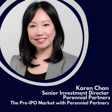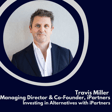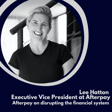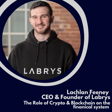Introduction to Alpha Females Invest Podcast
00:00:03
Speaker
Welcome back to the Alpha Females Invest Podcast. Two females working in the finance industry searching for Alpha. My name is Clooney. And my name is Emily. And together we bring diversified perspectives from the buy and sell side of the finance world.
00:00:18
Speaker
As usual, any information discussed in this podcast is not financial advice. All opinions reflect those of the individuals and this podcast is for educational purposes only. You should always read the PDS and talk to a financial advisor who can consider your personal circumstances before you invest.
Introducing Dania Zinarova
00:00:36
Speaker
Today we are very excited to have in person Dania Zinarova who is the Portfolio Manager of the Wilson Asset Manager Alternative Asset Fund. Dania has held senior roles in Australia, the US, Europe and the UK throughout her 24 year career.
00:00:52
Speaker
Most recently, she held the position of Director of Manager Research in Australia, Head of Real Assets, Australia at Willis Tower Watson. And prior to this, Dania held various real asset investment roles with Willis Towers Watson in London and New York. Welcome to the show. Thank you. Thank you for having me.
An Embarrassing Career Moment
00:01:10
Speaker
Great. Well, we like to start the episode the same way in every single one of our episodes so far. And that is, could you please share with us your most embarrassing career moment?
00:01:22
Speaker
Gosh, actually, I had to laugh, you know, just thinking about all the embarrassing career moments. Safe to say we've had a few. Yeah, so I could think about one that was pretty embarrassing. So I was starting at Willis Torres Watson in London. And my first day was the day of the Global Manager Research Summit, basically, when the whole global team and lesson team gets together in London.
00:01:50
Speaker
And we had an exercise to kick off just to get to know each other. And I was sitting next to Global Head of Private Equity team. So one of the questions, what's your favorite movie?
00:02:05
Speaker
And I turned to him and I say, born. And he thought that it was something different. So he went back completely red. And just kept staring at me.
00:02:22
Speaker
And then suddenly I realized what I thought. So I had to clarify myself that I was actually into spy movies. Imagine saying that as a legitimate response. Yes, that was, we still laugh, like, you know what I mean? You're always like, yeah, that, yeah, I like your movies. I love that that was where his mind first hour went to. I know. I think that's your first assumption.
00:02:49
Speaker
That's a great one and as Emma and I have said we've had plenty of fun and sort of fruitful stories. I'd love to know just to kick it off and to get to know you a little bit better, was becoming a portfolio manager always a career aspiration for you or have you taken a few twists and turns and ended up here?
Dania's Career Journey
00:03:05
Speaker
Yeah definitely quite a few twists and turns.
00:03:09
Speaker
I was initially really interested in banking and that was mainly driven by all the changes to the banking system at the time when I was finishing the university. And I actually went, like my degree was focused predominantly on banking. And I remember going on trips when I was younger with my father to Germany and he would always take me to the bank with whom he was doing the business.
00:03:36
Speaker
Deutsche Bank, Deutsche Bank it was. And I would look around and I would think, oh, I would love to be head of global Deutsche Bank or something like that. Like I just literally remember I was probably like 14 or 15 years old.
00:03:53
Speaker
that sector interested me a lot because I really saw it as the foundation of the financial industry. But also, that's why I'm so excited that you're doing this podcast because I just didn't know, didn't have enough knowledge about other
00:04:12
Speaker
potential career path within the financial industry. Over time, when I moved to London, I realized, gosh, it's actually not only about investment banks or funds management. It's much broader than that. So I did have a bit of a kind of sidestep at one point when I went into business management consulting.
00:04:34
Speaker
And fairly quickly realised, I think I stayed there for about nine months, that it wasn't really for me. So went back into investment world after that. It's really interesting to hear you say that you originally thought you were going to go into banking, because just before we started recording, we were saying that most people just think that's what a career in finance looks like.
00:04:55
Speaker
Even myself, I have been quoted on another podcast before when I was 16, my aspiration was to be head of Macquarie Bank. We'll see you of Macquarie Bank. So, similar, similar. But it's great to hear that, you know, there are so many different elements of finance and, you know, even people in finance move to different sectors like yourself.
Overview of WAM Alternative Assets Fund
00:05:14
Speaker
So let's dive into the product that you look after. So you manage the WAM Alternative Assets Fund, and that fund is all about providing exposure to real assets, private equity and real estate. I guess as a start, can we chat about what is a real asset? Yeah, sure. So what's
00:05:33
Speaker
important when we talk about WMA's portfolio is to understand the definition when we are talking about alternative investing. And I often talk to our shareholders, to the market participants, this is the only leak listed investing company listed on SX that provides diversification across alternative assets. Now, the next question is always like, what are alternative assets?
00:06:02
Speaker
I define alternative assets mainly as investments that are backed by assets. So we're talking about predominantly tangible assets from which we can derive value as investors.
00:06:17
Speaker
And that's a very broad opportunity set.
Valuation of Alternative Assets
00:06:21
Speaker
It does include, the portfolio currently includes private equity, venture capital, real assets. Within real assets, we can include agriculture, water rights, timber, other more esoteric strategies, real estate, infrastructure, private debt. So it's a pretty diverse opportunity set.
00:06:42
Speaker
And it's very rare that an investor can get single point access to this opportunity set. I saw that you were focusing quite a lot on real assets. Real assets is one part of the portfolio. So the portfolio is quite broad.
00:07:01
Speaker
I think that's an interesting sort of thought piece, given real assets is just one component. And you touched on that, you know, real assets is anything that's sort of... Anything not listed. Anything not listed. Don't invest in real assets. It's not good. No, but you said, you know, you can derive real value from them. I guess second to Emma's question, how do you determine the value of these assets? And, you know, from a valuation perspective, we've spoken a lot about that on our podcast. How do you value a stock?
00:07:29
Speaker
How do you value a real asset then and they remained in the portfolio exactly particularly as they are more illiquid and they might not have to rent comps right yes so it's it's very different evaluation approach i would start maybe first with.
00:07:46
Speaker
frequency of valuations and this is one of the differentiating factors for alternative investing when we talk about what are the benefits like one of the benefits is much lower volatility than public equity or the traditional asset classes because when we look at the stock market and you know it even better than I in terms of the volatility within the day how valuation can change and then day-to-day volatility
00:08:14
Speaker
While with alternative assets, illiquid, real, tangible assets, valuations are usually done on an annual basis. In some cases, valuations would be updated on a six-monthly basis.
00:08:30
Speaker
some of the strategies, or some of the sectors, like for example, enlisted infrastructure, they tend to have more frequent, let's say, quarterly valuations done internally, and then annual valuation is done by third-party value. So this is an important point, that those valuations, they need to be subjective and independent.
00:08:58
Speaker
When evaluation is done by an investment team, you know, there are certain questions on the independence and it's usually independent values who are specializing in different asset classes. They're the ones who would be doing it. So imagine daily volatility or even the volatility within the day in terms of the variations versus annual changes of the valuations.
00:09:21
Speaker
very different cycle. In terms of the approaches, usually we would talk about three main approaches. So when an investment is just done, it's very normal to hold it at cost.
00:09:35
Speaker
And it's very usual to see within private equity or venture capital that initially for the first 12 months, an investment would be held at cost. The second valuation approach is discounted cash flow. Then again, what's important to understand is
00:09:55
Speaker
what asset class we're looking at. DCF is less likely to be used within private equity. We did see it during the pandemic because so many businesses, they were literally burning cash rather than generating cash. So many private equity investors, they switched to DCF.
00:10:17
Speaker
In private equity or the likes, most commonly used valuation approach is market comparables, is when we look at similar transactions in the market, sometimes in rare circumstances, it's probably more common for venture capital, investors would look at listed equivalents. So there is actually a term public market equivalent, PME, when we refer to that market comparable approach.
00:10:46
Speaker
So, look, when I think about WMA portfolio, given different set of asset classes, I can tell you all of these three approaches are being used. And what's usually done by independent values, they produce a very detailed evaluation report, which often goes through all three approaches.
00:11:10
Speaker
And this is done to run this sense check if it's a market comparable approach and it's 40% different or like high or low from DCF or from the market transaction.
00:11:27
Speaker
Then there are questions, are we looking at the right elements when we do the DCF? Are we using the right input? And then usually what happens, there is a range. There is a lower valuation and the higher valuation. Values usually would recommend something in the middle.
00:11:47
Speaker
And then it's down to the investment team, which one would they adopt. Within private equity, often you would see that valuations adopted would be more conservative, so at the lower end. And this is because there is a very clear link with their incentive structure. Performance fee within private equity is often only paid on exit.
00:12:15
Speaker
So for the investment team, there is really no incentive to try and adopt higher valuation than what they currently hold the investment within the portfolio. I know it's a very detailed answer, but the question is really important for alternative investing and
00:12:36
Speaker
I think investors who are looking at those asset classes, they do need to have at least basic knowledge of what are the three key valuation approaches.
00:12:47
Speaker
It's interesting and there's a lot to take in and unpack there. I might just take a side step for a second. And you mentioned that typically there's lower volatility, but is that a function of the less frequent revaluation as opposed to the actual underlying value? So on the list of market, as you mentioned, we can have intraday changes in valuation and that's the market, the seed value, but you're not getting that in necessarily the real asset space.
00:13:14
Speaker
So the lower volatility, is that just a function of the change in revaluation or is it actually a lower volatile asset class?
Investment Horizon and Risk Factors
00:13:21
Speaker
I would say both.
00:13:24
Speaker
I wouldn't necessarily agree that if we look at a stock and we see volatility within the day or changes of the valuations like day to day, that means that the value of the assets, if it's assets backed business, are changing. If we start unpacking what's included or what's driving the volatility of the listed company,
00:13:48
Speaker
I would say, on average, currently, about 75% would be market noise. It doesn't mean that, let's say, we'll look at some of the larger real estate investment trust rates in Australia. I'm picking those because they are all asset-backed, right? They would hold a portfolio of 100 or more properties. Now, if the evaluation changes by 10% day to day, it doesn't mean the value of the underlying assets does.
00:14:18
Speaker
Within alternative investing, the investment horizon is also much longer than in listed asset classes. And we are talking here about 5 to 10 to 12 years. In fact, there are some strategies that would have a lock-in for 22 years.
00:14:41
Speaker
And investors who are sophisticated, investors who understand underlying drivers of those investments, they are very comfortable with those long-term investment horizons. Now, it's unlikely the same can be said about investors who are just focusing on more traditional asset class, like fixed income and equities.
00:15:02
Speaker
I think that's also a big difference in terms of how you measure the risks or what risk factors are involved in these two different asset classes.
00:15:12
Speaker
I think that's a really interesting point. Being in the market space, I understand that volatility day-to-day. As you say, often the value of Goodman's actual freestanding building has not changed. Exactly. But there is a lot of movement associated with management, with market movements, with results of other companies. They can drag down or up in other companies' results. I think that's a really interesting point for people that
00:15:38
Speaker
do see the market has been quite volatile, maybe this is a different avenue. So turning a little bit, you did say that the return timeframe can be a lot longer on these types of assets. I noticed that you guys target an absolute return. What does that mean and could you tell us a little bit about how performance has been over time?
00:15:57
Speaker
Yes, so actually what we communicate to our shareholders and to the market that the goal of WMA is to deliver
00:16:09
Speaker
an investment return that would be driven by income and capital appreciation. And the key point or the key attraction point for WMA is its diversification benefits and the stability of the income return. The stability because the company is structured as listed investment company and we have very long term sustainable over the years dividend policy.
00:16:38
Speaker
where we are focusing on our profit reserves and our ability to cover the dividends for at least the next three to four years. So we do have a lot of visibility, what we can pay and how our profit reserve behaves over time, what dividend coverage ratio we have.
00:16:59
Speaker
When we assess the portfolio from the investment return perspective, then we would look at, you know, we say like market comparables, what's an average core alternative
00:17:14
Speaker
investments return within the Australian market so on average over the last let's say 10 to 15 years and we're talking about core strategy it would be around eight percent so for our internal purposes when we look how we are going in terms of the performance we would sometimes refer to that average however we don't have the actual hard hurdle or the actual target that we would define
00:17:44
Speaker
and we need to beat this benchmark. When I look at the investment performance since inception, when Wilson Asset Management took over the management rise for the portfolio which happened in October 2020, the investment return was over 17%.
00:18:03
Speaker
So it's been per year or since the... Per year, which has been driven a lot by capital appreciation, but at the same time a good component of income return. And this is when I think about the future of the portfolio and the objective that they have is to ensure there is about 40% of core income generating investments within the portfolio.
00:18:32
Speaker
And then 60% is growth investments that would deliver predominantly capital appreciation. So this provides a better balance in terms of the risk profile and the return within the portfolio.
00:18:50
Speaker
And this is not the only thing that you would look at when you assess LAC, because you also have total shareholder return when you take into account where is the share price from the time that you invested to the time that you're in now. So to put it in the perspective, for the last financial year, the total shareholder return was 46.5%.
00:19:19
Speaker
this is because the share price was trading at discount to NTA and so investors who got in in 2020 and then if they realized that return that was a pretty attractive return. Yeah, March 2020 was a good time to get into the market. So you talk about 40%
00:19:41
Speaker
of the portfolio target to be income generating assets. I guess we'd be interested to understand is the way to think about this split up by asset class or is it more this particular asset. So what I mean I guess is, is there a particular
00:19:56
Speaker
yield versus capital return in between real assets, private equity, and real estate? Yes, good question. So nearly within each asset class, you'd be able to split strategies by core value and opportunistic. So when we talk about core strategies, we are basically talking about investing in mature, established assets, what some investors refer to as brownfield assets without any development risk.
00:20:25
Speaker
and lower use of leverage, pretty hands-off asset management, just income generating with long contracts in place. These would be asset classes such as real estate, infrastructure, some of the real assets, not all real assets, potentially some of the private debt, in particular when we talk about senior debt.
00:20:52
Speaker
All the rest, private equity, venture capital, they would be in the growth category. However, they won't be the only ones because there are also some opportunistic strategies within infrastructure, opportunistic strategies within real estate. So some asset classes can offer only certain risk return profile, while others can be quite broad in terms of the opportunity set.
00:21:20
Speaker
Yeah, that's really interesting in terms of the risk return profile. I think we've spoken about the benefits of having an exposure to this type of asset class in the sense that it is much lower volatility. There's a longer term horizon here. You can see real gains.
Strategy for Exiting Investments
00:21:34
Speaker
Would you consider it to be an illiquid asset class because of this inability to trade daily? And do you think investors should add a risk premium onto it for that?
00:21:44
Speaker
The specific reason. Definitely, yes. I'm hearing some CFA there, Klee. I was like, yeah, this is, you know, music to my ears. Look, when we talk about different risk premiers, liquidity is definitely one of the bigger areas where you want to see additional premiers when you take this liquidity. Other factors that you'd look at would be skill, alpha potential, and
00:22:15
Speaker
Just thinking about your question, is it because you can't trade when you invest in those assets on a daily basis? Yes. It's also because of this strategy that you'd usually implement as an investor.
00:22:31
Speaker
The idea is, let's say we're talking about one of the portfolio companies within private equity. The idea is not to buy well and then sell well the next day. The idea is to buy well. Obviously, you need to be
00:22:47
Speaker
very disciplined on pricing as an investor. But where the actual skill comes in is how you implement, be it growth strategy, buyout strategy, turnaround strategy. What are your skills to implement this strategy if you're buying, let's say, fast food chain as a private equity growth investor?
00:23:11
Speaker
one of the goals would be to either grow the business through other M&A transactions and add-on businesses across different states or even outside Australia, or is the business more of a turnaround where you are basically tasked with restructuring a very complex business and then selling separate parts. So the strategy itself within alternative assets requires this long-time horizon.
00:23:39
Speaker
to implement and then to realize the value. Which kind of leads onto our next question, which is what happens when you decide to exit an investment and how quickly can you execute on that exit?
00:23:52
Speaker
I would say it really depends on the asset class. First, it depends on the market condition. Second, so if it's an infrastructure asset, let's say one of the major airports or ports, and it's a competitive auction, it may take
00:24:15
Speaker
three to six months to basically from the start of the process until the transaction is settled. If we are talking about real estate, let's say an office building in Sydney CBD, sometimes it can take a month or two months to settle the transaction.
00:24:34
Speaker
So it's very asset class specific, and I would even say it's very asset specific. The timing is also very important. So going back to your previous comment when we talk about the risk premium and other factors influencing the premium, that's also the skill, right? To time when to exit. Let's say as an example, within WMA, we had a very interesting business, Better Medical, which was basically a portfolio of GP clinics.
00:25:04
Speaker
Healthcare investments is a hot topic across asset classes, in private equity in particular, because it's really difficult to get hold of those assets. And there was a lot of competition. So as an investor, you would look at the market. How competitive is the market? Are there more buyers than sellers? Who are the groups? What is my exit strategy? Is it IPO? Then I depend on the listed market. Let's have a look at the listed market.
00:25:34
Speaker
How IPOs going at the moment? Is it a strategic buyer? Is it a trade buyer? All those options need to be considered. Private equity often they don't like to publicly say what is their official exit strategy because then obviously if
00:25:54
Speaker
I wouldn't call the name, but I was talking to someone and they said somehow information leaked to press that they were going after trade buyers. Now that impacts their price because trade buyers, they don't intend to pay as well as a strategic buyer within private equity. So that's another feature of the market, the information inefficiency. It's all about who is your network,
00:26:21
Speaker
What are your connections? You know, how well you can negotiate with people. It's such a different story. How this type of transactions happen within the public markets. You touched on healthcare being a really hot topic. And, you know, it's clear that we've just been through a two year pandemic.
Trends in Alternative Investments
00:26:39
Speaker
We're now in an endemic, I believe the right terminology is, but clearly healthcare has been a huge trend.
00:26:45
Speaker
Are there some other trends that you see coming to the forefront of investors' minds this year, and perhaps could you enlighten us on what they might be?
00:26:52
Speaker
Yeah, I probably won't surprise you with this, but digitalization is definitely a big trend. And I expect that it will only continue. We'll see more transactions in this space within venture capital, within private equity, even within infrastructure. Investors talking now about digital infrastructure. While five years ago, it was predominantly private equity players who would be active in that space.
00:27:22
Speaker
I would also say climate change decarbonization theme, that's becoming really one of the key topics. And what was interesting to observe this year that certain geopolitical events started pushing both governments and private investors to really reactivate and ask themselves questions.
00:27:47
Speaker
how can we diversify our energy sources? Because what's obvious now, how our society is dependent, exactly dependent on commodities? Well, I feel like we've been talking for over a decade about renewable energy, alternative energy sources. So while, of course, it's very sad and horrible to see those events happening in Europe now, at the same time looking at this,
00:28:15
Speaker
I feel optimistic that we might have a much better progress over the next 12 to 24 months. And this is climate change and technology related because lots of those sectors would require innovation.
00:28:30
Speaker
It's interesting because I have the same view. I think it makes complete sense for companies to be investing in renewable energy. But some people do push back on that and say that actually it brings the case to not shut down your coal plants by 2030. And I'm with the Paris Agreement because we have this energy crisis. So it's an interesting debate. But back to the topic. Yeah. 2021 was obviously a very big year for mergers and acquisitions and transactions. Do you expect that 2022 will also be as buoyant?
00:28:58
Speaker
I was expecting that to happen. Actually, I remember in January, I was looking at one report in Australia only. Last year, we had about 120 billion in M&A activities. Everyone suddenly just reactivated.
00:29:17
Speaker
And many people were expecting that 2022 will continue being as busy as last year. The start hasn't been as busy. And this could be also because of those geopolitical events that are happening in Europe now and this impact on global economies. You know, everyone is asking the questions, what does it mean?
00:29:40
Speaker
Does it mean the commodity prices will continue going up? What does it mean in terms of the inflation? I had an interview. Actually, I have to watch it again. It was in January with Bloomberg News and asked me a question about inflation and interest rates. And I was really optimistic at that time. I'm still probably more optimistic than most investors, in particular who are
00:30:06
Speaker
active within public markets because I think public markets they pick up this information much quicker. I do think after seeing you know federal budget we have inflation under control and you know even if it's about 4% a year it won't be the same as in the US and then Australian economy is still
00:30:28
Speaker
quite an isolated, self-sufficient economy. So again, we might see interest rates going up, maybe 50 basis points, but I don't expect it will be out of control, like in other global markets.
00:30:45
Speaker
Important thing, I'm biased, of course, but important thing, alternative investing can serve as a natural inflation hedge. Because if we look at some asset classes like real estate or infrastructure, within real estate, rents are usually linked to CPI. Within infrastructure, when we look at long contractual revenues, they are often linked to CPI as well. And similar to interest rates.
00:31:15
Speaker
So, in terms of the investment portfolios, it's actually for any investor, you know, be it the retail or institutional investor, having this diversity and having this potential, you know, inflation protection is a really good thing.
00:31:33
Speaker
Yeah, that's definitely a key benefit, I think, of this area. And I know in many conversations in the finance industry, inflation is a hot topic, and you get the bears and the bulls, and some people think rates are increasing exponentially, and others like yourself are a little bit more on the conservative side.
00:31:50
Speaker
We might turn back specifically to the funds now. And I think we would love to hear a couple of investment examples of maybe some of your best performers in the funds. There are quite a few. I would perhaps first explain how the fund is structured. So we are now in what we call revitalizing the whole strategy.
00:32:15
Speaker
or the whole portfolio. So when we took over the management rights of the portfolio, I did the analysis on the underlying investments and what became obvious that majority of the investments in the portfolio, they are maturing. So basically,
00:32:33
Speaker
You might be familiar with the definition, vintage. So within private equity and venture capital, vintage is about 2016, 2017, which means now we are seeing more and more exits.
00:32:50
Speaker
from those investments and their really attractive returns. If I think about the exits that we had so far, most of them were above carrying value. And thesis on healthcare played out really well.
00:33:07
Speaker
We had a really strong exit when the transaction on Beto Medical happened last year. We had few strong exits. One was a property asset in New York, Manhattan. While the portfolio is predominantly focused on Australia, we do have some exposure overseas.
00:33:25
Speaker
And that was on the back of the fact that in areas like Manhattan there are just no or not many new or refurbished office buildings. So that was a really good timing. Market reopening, everyone is going back to the office, everyone is looking for an upgrade, excellent exit that we had on that asset.
00:33:46
Speaker
There was another exit on quality food services. That's kind of more of a theme that we have within the portfolio as well, increasing demand for food and more focus on that area. So over the next 12 to 18 months, there will be more exits coming through. I expect exits above carrying value for most of the investments.
00:34:10
Speaker
That's great to hear. And turning to your own personal work experience, you know, we quoted in the bio that you've had experience in London, in New York, and of course, we're here in Sydney. We'd love to hear a bit about how investing can compare across regions at this stage. Colleen and I have only ever worked in Australia, so we'd love to hear about your experiences.
00:34:31
Speaker
Every market is unique. Europe is probably the most difficult one to describe as one market because it's one thing you have experience of investing in any class in London in terms of the dynamic, in terms of accounting standards, in terms of variation approaches, the market dynamic. It would be very different from, let's say, Germany.
00:34:56
Speaker
even within Germany, it would be different whether you're investing in Berlin or you're based in Berlin or you're based in Munich. It would be like a different market. So that was quite interesting when I was at Russell Investments and I was focusing on European and US real estate.
00:35:17
Speaker
like two different worlds because US at that time, when I was at Russell, it was already a very sophisticated, very advanced, very mature market. So I found it, from my perspective as an investor, doing due diligence on investments in the US was much easier. Very transparent, standard information that's accessible,
00:35:46
Speaker
It made it easier for me, you know, as an analyst looking at the investments and comparing them when I was based in the U.S. and I had that experience, while in Europe it was more fragmented and it really depended which markets you operate. And there were some European property funds that would invest across Germany, Italy, Spain, France, London,
00:36:13
Speaker
All of them, I remember that pretty clearly, had to have people on the ground often with local language, local market knowledge, local connections. Doing an investment in property across Europe out of one office in London was extremely difficult and extremely challenging. So very unique experience. Again, I spent a bit of time in Asia as well.
00:36:37
Speaker
you know, Hong Kong from very different from Singapore. So learning from all those different experiences is definitely beneficial and I always advise when I can or like when I mentor people.
00:36:53
Speaker
Go over your comfort zone and go and have experience in the US, go and have experience in Asia because this all makes your experience richer, makes it easier to judge in the future when you look at the risk adjusted returns and compare.
00:37:10
Speaker
I couldn't agree with that comment more, Dania. I think there's definitely a stage where Em and I would both love to go and work in a different market because as you said, you pick up so many new answers and such a different dynamic from working with not only different markets, but different culture, different people, and the likes carry on.
Career Advice from Dania Zinarova
00:37:28
Speaker
You touched on a little bit just then that sometimes when you mentor people, that's a tip you give them.
00:37:33
Speaker
We always like to end our episodes with asking our speakers for their top career tip. So could you please share with us yours? Top career tip, my tip would be start early with determining your career goals. And please do not focus just on your career when doing so, but take into account
00:38:03
Speaker
your personal life, your interests, your aspirations and what drives you as a person. So having this bigger picture, basically what they call zoom out when thinking about your career is extremely important.
00:38:19
Speaker
I would also say there are a lot of publications now being done on that. And I think one of the latest one was by CFA Institute here in Australia. They were talking about T-shaped careers. So basically, when we look at our world now, it's much more complex than it was when I was starting my career.
00:38:45
Speaker
And in the past, we tended to think about quite narrow technical areas where we had to excel, or at least we felt that this is where I had to excel to achieve my career goals. Now, this has shifted to what they describe T-shaped financial professionals, whereas the vertical line is your technical,
00:39:13
Speaker
deep expertise in an area that you choose. And then the horizontal line includes your communication skills, your negotiation skills, your network, et cetera, et cetera. So all those factors are becoming extremely important in today's world. And I think don't worry when you start the career and you think, is it the right choice? It's a progression.
00:39:40
Speaker
I love that concept of zoom out. I do think people can become very focused on their little bubble or the little world they live in. As we discussed before the start of this podcast, one of the reasons we started it was really to help people understand that there are so many diverse careers within the financial realm and that extends to so many different areas.
00:40:02
Speaker
I think that's a really, really great tip on zooming out, think about your career as a T shape and opportunities will present themselves. So I just wanted to say on behalf of M&I, thank you so much for doing the episode with us today. I know I've really
00:40:17
Speaker
learn enjoying about the real asset class and you know specifically I guess some private equity to a different degree. It's very different to what we do so it's always interesting to have another diverse perspective and I'm sure our listeners really enjoyed it too. So thank you Dania. Thanks Dania. Thank you, my pleasure.
00:40:34
Speaker
Thank you for listening to the Alpha Females Invest podcast. If you liked this episode, we would love your support on Instagram. You can find us at Alpha Females Invest. You could also leave a podcast review, but most importantly, please keep listening. See you next time.


